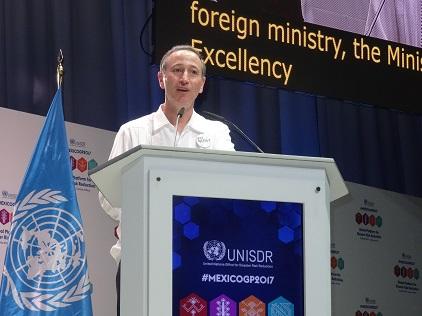At least 87 countries should systematically account for disaster losses by 2020, which first and foremost constitute losses resulting from the impacts of climate change. This is the central conclusion of the Global Platform for Disaster Risk Reduction which ended in Cancun, Mexico on Friday, May 26, 2017.

The year 2020 is the deadline set out in the Sendai Framework for Disaster Risk Reduction for all countries to have such strategies. In the 22 years that have passed since first UN Climate Change Conference (COP1, in 1995 in Berlin) the number of weather and climate related disasters has doubled.
The UN Secretary-General’s Special Representative for Disaster Risk Reduction (UNISDR), Mr. Robert Glasser, said: “We can only prove progress on reducing disaster losses if we know accurately what those losses are. Today we heard evidence that these countries are putting data baselines in place and this effort needs intensive support over the next two years.”
Given that 90% of recorded major disasters are climate-related, action that addresses the interlinked challenges of disaster risk, sustainable development and climate change is a core priority.
Reducing greenhouse gas emissions is the ultimate form of disaster risk reduction as it prevents the creation of new risk while also reducing the stock of existing risk levels.
The Paris Climate Change Agreement’s overarching goal to limit global average temperature rise to as close as possible to 1.5 degrees Celsius. Adhering to this goal is the greatest long-term contribution that governments, local governments and the private sector can make to disaster risk reduction.
Ahead of the Global Platform for Disaster Risk Reduction in Cancun, UNISDR chief Glasser and the Executive Secretary of the UN Framework Convention on Climate Change (UNFCCC), Patricia Espinosa, called for joint action across the 2030 Agenda and the Paris Agreement on climate change to achieve the Sustainable Development Goals and address Disaster Risk Reduction.
At the closing plenary, Mr. Glasser paid warm tribute to Mr. Luis Felipe Fuente, national coordinator of the Mexican Civil Protection Agency, and the team which put their heart and soul into ensuring the success of the Global Platform. He also commented on the rich community of practice in disaster risk reduction and its capacity to bridge the worlds of humanitarian aid and development.
The Chair’s Summary contains key recommendations including improved support for the preparation of national disaster loss databases; early warning systems for least developed countries; empowerment of local authorities to manage disaster risk; application of disaster risk management to overall economic planning; and the empowerment of women in leadership on disaster risk management.
Risk-informed investments for the resilience of infrastructure and housing, especially for the poor and vulnerable, was the focus of the Leaders’ Forum co-chaired by the President of Mexico, Mr. Enrique Peña Nieto and the UN Deputy Secretary-General, Ms. Amina Mohammed, which concluded on Wednesday, May 24, 2017.
An overview of the Chair’s Summary was presented by the Mexican Minister for the Interior, Mr. Miguel Angel Osorio Chong, who said the focus of the three days was very much on moving from commitment to action and ensuring coherence across implementation of the Sendai Framework, the Paris Agreement on climate change and other elements of the 2030 Agenda for Sustainable Development.
The Minister hoped that the Global Platform would lead to a worldwide increase in efforts to implement the Sendai Framework for Disaster Risk Reduction.
He also recalled the outcomes of the preparatory days which included a Multi-Hazard Early Warning Conference and a meeting for Small Island Developing States focused on climate change and practical solutions.
Some 4,000 participants and delegations from over 180 countries attended this 5th edition of the Global Platform which was held outside Geneva, Switzerland for the first time and hosted and co-organised with the Mexican government.
It was the first global gathering on disaster risk reduction since the adoption of the Sendai Framework in Sendai, Japan, at a UN world conference in 2015.
Mr. Manuel Bessler, representating the Swiss Agency for Development and Cooperation, paid tribute to the outstanding organisation of the Global Platform by the Mexican government, notably for its inclusive nature and the prominence of private sector participation.
He extended a warm welcome to delegates to attend the 6th edition of the Global Platform in Geneva, Switzerland, in 2019, when the focus would be on progress made in further implementing the Sendai Framework and acting on the recommendations in the Chair’s Summary.
